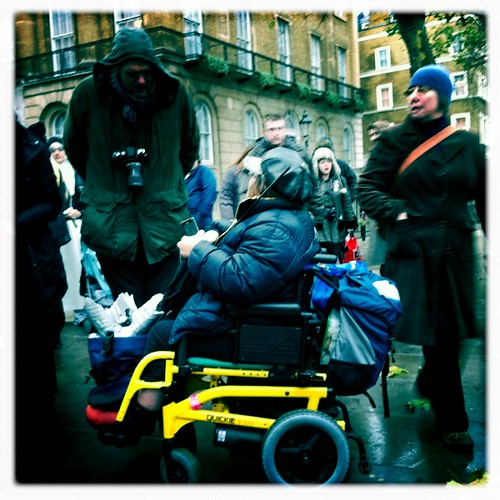

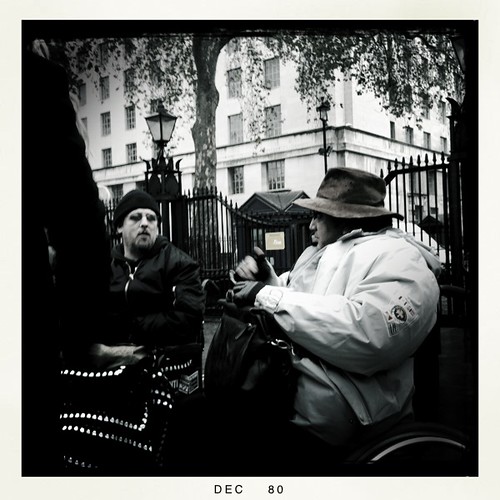

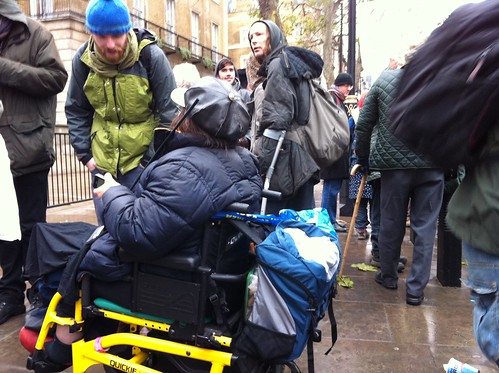
When the 12:30pm Downing Street protest wound down a few of us went to grab a pub lunch before heading to Trafalgar Square for the 3pm protest there.
Once in Trafalgar Square DPAC had planned to perform an alternative nativity play under the tree. Trouble was, Mary hadn't turned up. There was much bustle while they tried to find a new Mary (I declined the invitation).
Eventually a Mary volunteered and everyone moved themselves under the tree.
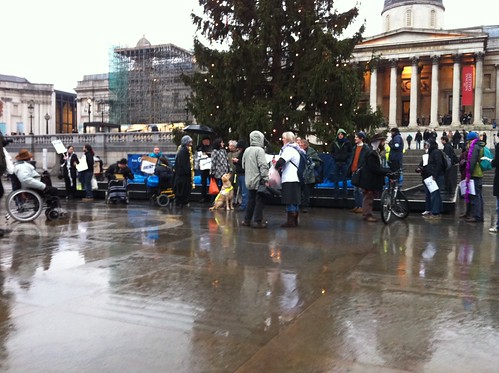

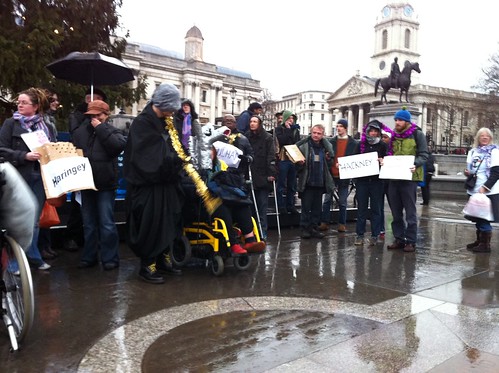
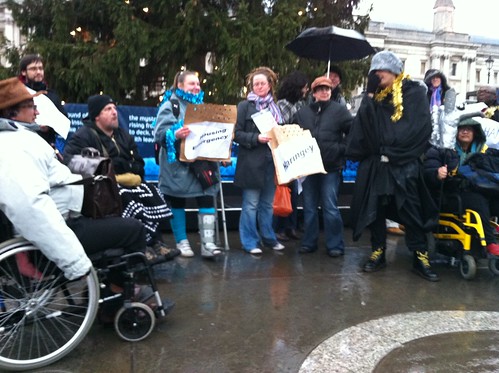



The Heritage Warden getting pushy.
The discussion after the Heritage Warden said he was going to call the police. The police came and said that we were fine there as long as we were quiet.
I missed the first couple of seconds of this speech which places the monologue in 2015.
It was at that point that I left. The rain had soaked through my gloves so my hands were getting cold (over the years I've broken almost all my fingers and when my hands get really cold all those old fracture sites feel fresh). The rain had also soaked through the knees of my trousers (being a wheelie my knees are at an angle to catch every drop of rain that falls) and my boots were moist and heading towards soaked through (and just like my fingers I've broken a hell of a lot of bones in my feet and they don't appreciate the cold either).
My overwhelming experience of the day was disappointment: Disappointment that so few people care enough about our social housing and welfare state. The way I see it, for currently privileged people campaigning to save social housing and benefits is like taking out an insurance policy. You hope you won't need it, but it's there as a safety net in case something goes wrong in your life plan. On Twitter recently there's been much talk among students, trade unions, UK Uncut types and general leftie tweeters about "#solidarity" and I know of many disabled people who've shown support for others facing cuts: Where was the solidarity for us?
A lot of disabled people are not in a strong position to protest against the cuts. Some of us are housebound or bedridden. Some of us have crappy immune systems and this is a really bad time of year for viruses flying round, or are just permanently too ill to go out for a whole day. Some of don't have suitable mobility aids or access to transport that would allow us to get to a demo. Others of us have bodies that couldn't withstand the cold and rain on a day like yesterday. I know my bones and joints would've been happier if I'd stayed home yesterday but I felt that I couldn't sit in my council flat hoping someone would protest on my behalf because if I did I might not have a council flat left in a few years!
Then there are the disabled people who were scared into not coming yesterday. Because we live in a culture where many disabled people are constantly afraid of leaving the house in case they get spotted walking/socialising/shopping and accused of benefit fraud (thanks to campaigns like The Sun's) people are too scared to protest. And apparently if you can protest you must be faking your impairment.
Then there were the people too scared to come after witnessing violent scenes at recent student protest, particularly what happened to Jody McIntyre. A lot of disabled people injure more easily than Joe Average (I myself have got brittle bones) so it doesn't take too vivid an imagination to picture yourself more likely to get hurt than most protesters. And if the non-disabled Alfie Meadows can be left needing brain surgery...
It's quite depressing that the government is not only disproportionately targeting the cuts at disabled people, but they're also scaring us into not using what little voice we have. If the government have got us too scared to protest by making sure everyone thinks we're scroungers and the police have terrified us into not hitting the streets then they can continue with the attacks on us by saying "well, no-one objected."
The next protest is on January 24th 2011 and if you can, I'd strongly urge that you come. Even you non-disableds, whether it's out of solidarity or as an insurance policy for your future.

There is of course the fact that disabled people are simply too ill to get out to a protest, either all the time or on the day. I've been feeling pretty rough myself the last couple of weeks so had to pull out of helping organise something for this, although I did get out to our local Save Our Services march last month.
ReplyDeleteUnfortunately it's a truism that the most vulnerable and poorest are exactly the ones who are least likely to protest, respond to consultations and stand up for themselves generally. I'm convinced that's a major factor in them regularly targeted when cuts to services are on the agenda.
Some of us cannot travel to London or up North where you seem to have these protests. It takes far too long to travel and also there's the cost involved too. The National Press did not publicise this protest in advance and it assumes that all disabled have a computer and just happen to know about this website.
ReplyDeleteFor protests to work then you must plan them in at least a city and a town throughout the Country - then people that live out in the sticks may actually be able to attend.
Oh this all makes me so sad. :(
ReplyDeleteFirst two commenters - did you even read the post?
ReplyDeleteLisa said "A lot of disabled people are not in a strong position to protest against the cuts. Some of us are housebound or bedridden. Some of us have crappy immune systems and this is a really bad time of year for viruses flying round, or are just permanently too ill to go out for a whole day. Some of don't have suitable mobility aids or access to transport that would allow us to get to a demo. Others of us have bodies that couldn't withstand the cold and rain on a day like yesterday."
She's asking where the ABLE people and WELL OFF were, because PWD have supported every other protest, but nobody turns out when PWD need help.
Sadly, as you mentioned in your article, I think there are a lot of people who really would have liked to have gone, but had reasons not to.
ReplyDeleteI don't know what can be done to encourage/enable more people who would like to take part to go. I can only suggest joining up with other affected groups and piggybacking along to the bigger scale demos against cuts, such as the education ones we have seen recently.
Really sorry to have missed this. I think there was some confusion in the advance advertising, as I was sure the protest was originally advertised for 18 December - maybe the page I saw it on was wrong. Hope more support can be drummed up for 24 Jan.
ReplyDeleteNext protest is a day I'm not working - count me in.
ReplyDeleteI was disappointed at the lack of numbers too. But it's also not got the same kind of mass communication impetus that student protests have. People often act en masse. Students are (to a degree) a cohesive body - they are a cohort belonging to an educational establishment. Communication will spread through college and uni as much as by internet communication, and feeling part of a mass means people are willing to travel to a protest.
We are a disparate community, not living and socialising in big clumps. It's hard to feel a swell of motivation to come to something when you're an individual.
I'll definitely be along, and I'll definitely spread information via Twitter, Facebook, and Livejournal, but that doesn't have the impact of a group of people sitting around a pint discussing going to a protest.
She's asking where the ABLE people and WELL OFF were, because PWD have supported every other protest, but nobody turns out when PWD need help.
ReplyDeleteI was working. My employer prefers that I give one month's notice of all time off. Organise a protest on a Saturday, or a Sunday, or with sufficient notice that I can book a day's leave, and I'll be there.
What about localised protests - anyone from Edinburgh out there? Am happy to get down to the Scottish Parliament on the 24th Jan but can't really afford to come down to London.
ReplyDeleteI think the main problem was lack of advertising, many people I have spoken to had no idea of the protest taking place.
ReplyDeleteI'd be happy to put something on Fibroduck if it helps get word round. Sadly I am one of those with a crap immune system so mixing with crowds has to be avoided cos of germs.
I'm sure those of us that can't get out to attend can help in other ways?
Jamie/Fibroduck
It made me sad too, but I wasn't surprised either. The very fact we are disabled makes it harder to actually get out there and protest. I did think a few more able-bodied allys might have showed up to give support, though.
ReplyDeleteWe need to get really organized with transport etc. Liaising with students who are willing to physically push the disabled people who want to be there would help too.
I remember a few years ago disabled people were protesting about the cuts (Tory) in local care and they managed to park all their electric wheelchairs in zebra crossings and their more mobile friends unplugged the wheelchairs and caused a bit of a headache.
I'm a (mostly) able bodied supporter of disability movement but I'm afraid I didn't hear about this protest either. I think as other posters have said, the student movement was able to capitalise on having existing cohorts to draw from, and are regular uses of social networking tools like Twitter and FB so word spreads fast. Interestingly though, at the student protests there were lots of placards and signs about disability issues, but these didn't get reported in the press. Are there FB pages, or specific groups affiliated to the Coalition of Resistance to help spread the word?
ReplyDeleteEven without communication problems we have to recognise that many of us are simply physically unable to take part in on-street protests. I can manage a lot of things, but I gave up going into London several years ago, the physical consequences simply made it infeasible, and what goes for me goes for many other disabled people. That means that we need to focus even more on campaigning via the internet, or by writing to MPs and ministers. It may not have the headline grabbing power of 20,000 students on the streets, but it's what we can do, what we need to do.
ReplyDeleteI just LOVE how most of the pictures were taken with the paid iPhone app Hipstamatic. It really shows how deeply these benefits are needed by PWD. If they don't get them they may need to downgrade to a non smartphone and we all know an iPhone with its expensive data plan is a human right. Seriously who'se brilliant idea was that?
ReplyDelete@tara: Not that I should justify to you how I spend my money but I feel the need to point out that the app costs 59p. The phone itself was a Christmas present seeing as I couldn't afford it myself.
ReplyDeleteI see the "disabled people shouldn't own nice things" mentality is now everywhere.
Of course, if I didn't have impaired hands I wouldn't have needed a phone with a speech-to-text app available for it. So it's not like needing an iPhone if I wanted any kind of smartphone was a disability-related thing or anything.... *headdesk*
Good point @tara. Some of them have really flashy wheelchairs too. What's wrong with a tray on castors that they could move by scrabbling on the ground with their hands? Eddie Murphy had one of those in 'Trading Places' and he's loaded. ( and I bet he's not a benefits scrounger either )
ReplyDelete@tara.... That comment infuriated me! I refuse to justify my right to own an iPhone or any gadget to you! Being disabled doesn't mean we are not entitled to 'nice things' why are we seen as being so different to the rest of society? Damn the media and 'those in power' for allowing people to think those kind of comments are acceptable!
ReplyDelete@Tara- sheesh, think before you type girl! Rather than maintaining a 'everybody is out to scrounge' attitude why not engage your brain and compassion and first stop and think- why? Why might someone have this item?
ReplyDeleteYes, there are people out there that misuse the benefit system, but believe me, they are the minority, unlike what the Daily Mail would lead you to believe.
I personally would like for it to be possible to inflict all those that seem to think it is beneficial to be disabled with a serious disability and health problem... let them find out the hard way what it's REALLY like to live on a pittance and be treated as we are treated! I'd like to bet they change their mindsets then.
ReplyDeleteAs it says in the good book... do as YOU would be done by.
Also, RE: the article.
ReplyDeleteMany students detest the Tory-led Govt. I believe that if you could get them on board, with a weekend protest nationally, you'd have bigger numbers. At our local anti-fee's protest we had babies from 4 months old with their mother's to 80 year old Granddad's all in it together. The ukuncut demo's have had great support from all walks of life too.
Many people who are going to be effected by cuts don't realise they are. It needs to be brought to their attention.
@Tara Apple products have some of the best inbuilt accessibility around. A regular phone (but only limited numbers of) set up for a blind user has an additional £700+ pricetag for the reading aloud software which you might agree is essential if a blind user wants a phone. Having a mobile is considered fairly essential for communication, leisure, work and very useful in emergencies which disabled people might have more often than non disabled people.
ReplyDeleteAn iPhone costs substantially less than the restricted phones + specialist software. The screen reading is built into every single phone Apple sell. This enables blind people to use an iPhone almost as a sighted person would. For a change the 'assistive technology' isn't an expensive add-on, it's part of an admittedly high end phone itself. Still it's an awful lot cheaper than most disabled gadgetry which can cost 5-10x an equivalent non-accessible product just for the access bits. A portable computer designed for blind people can cost £3000. An iPad which with some hard work and learning costs ~£500. Do the maths and be happy that for a change disabled people are included properly and not being ripped off by their needs.
The speech to text (Dragon) app for iPhone is increasingly being used by disabled and non disabled iPhone users alike. I know some people who can't type on a standard keyboard who can use one of the touchscreen keyboards on a smartphone - if I have to type left handed this applies to me.
Also for many people their gadgets enable them to still socialise when they are restricted to bed because of illness or fatigue related to their disability. You wouldn't grudge someone who otherwise had v little money the chance to email or chat to their friends and indeed the chance to participate in society
@Tara, you ever been housebound, even temporarily by illness? I have, both with and without internet at different times. It was way more tolerable with (admittedly I wasn't reading comments like yours, that wouldve been more demoralising than being isolated...) than without. And that was for short periods of time, maybe a week of so, with an illness that didn't proceed to last months or years in severe form. Why should anyone be cut off from the outside world due to physical disability? Maybe because you find it offputting to read about?
ReplyDeleteMany disabled people need certain so called 'gadgets' to enable them to function in life, many are not luxuries but necessities. These so called 'gadgets' are always exceptionally expensive and it's not a case of one not getting a 'gadget' because one is not able to afford the 'gadget' but a case of one having to afford the ]gadget' because it is essential.
ReplyDeleteI have to have an electric wheelchair and the purchase of this wheelchair was an essential item thus stopped me funding an MA. Recently the essential item of a wheelchair led to another essential item - a new battery, to the pricely tune of £552. We made need so called 'gadgets' to enable us to lead a so called 'normal' life but trust me, the majority of the time they are not luxury items but necessities and they definitely do not come cheap.
If anyone wished to purchase an electric wheelchair as a luxury item, they are welcome to but I would rather be able to purchase something that is for leisure than a neceissity.
It is expensive being disabled and when you are forget saving for a rainy day!
All I am saying is that while you complain about getting fewer benefits many hardworking people who themselves can not afford an iphone or novilty paid apps are being forced to pay for someone who can afford one. That is totally backwards.
ReplyDeleteYou're absolutely right Tara. We shouldn't be allowed to spend our money on anything nice or to allow people to buy nice things for us. On fact, because our money comes from the government, they should be able to tell us exactly what to spend it on.
ReplyDeleteWhile we're at it though, these hardworking people's money comes from their employers so their employers can tell them how to spend their money.
Except the employers money comes from the people who buy their products, which includes me so I guess that means I get to tell you how to spend YOUR money.
Tara: I'll buy you an iPhone if I can also take away the use of your legs. Fair trade?
ReplyDeleteTara,
ReplyDeleteFor 30+ years I worked and paid my taxes. I was then struck down with an illness, paid off by my employer and had to go on Incapacity Benefit - all £91.40 per week of it. I would gladly go back to work again if I was able, but I'm not and so the internet is my window to the outside world.
We are not all scroungers. The majority are genuinely ill.
There is a lot more of "your" money going to people on Tax Credits than to Disabled people. Perhaps you'd like to pick on able bodied people instead?
Then, Tara, surely your issue is with the taxation structure in this country, rather than with the people in receipt of tax-funded assistance - who, by definition, have rather less power and ability than you do to change the aforementioned taxation structure?
ReplyDeleteBut it's so much easier to look at a whelchair user with a fancy phone, see that you're too used to a couple of extra glasses of wine a week to find the £20 a month for your own, and blame them for sucking up your taxes, isn't it? Why bother to think any deeper than that? Especially when there's a government and half a dozen newspapers telling you it's OK to stop thinking and kick the cripples...
Here's a radical suggestion. Go away and see if you can work through a budget to come up with an extra £20 a month at the end of it (less whatever you spend on PAYG at the moment). In fact - let's make it the £7.50 a month my Android phone costs me. Then, if you really can't see how it can be done, come back, show us that budget, and we'll see if we can help. Then you can have your very own iPhone, and you can stop feeling jealous of all those lucky people whose functioning in society is substantially compromised.
(To the moderators: Sorry if I've gone overboard. I'm a mite ticked off.)
You can get a second hand, first generation iPhone for as little as £100. You can also have a call package with unlimited internet for a mere £10 a month. Please purchase one for yourself Tara and stop misdirecting your iPhone envy at people who clearly require a smartphone.
ReplyDeleteTara, what kind of joyless, callous, selfish world do you really want to live in? Is it not enough that people have to suffer disability, with all the limitations and pain that involves, without miserable, resentful idiots like you suggesting they should be left in abject penury to compound it? Nobody chooses to be disabled. Yes, lots of people struggle financially, and lots of people work hard. Disabled people included. Count your blessings and have a good think about developing a modicum of compassion.
ReplyDelete@Tara you clearly didn't read what I wrote did you?
ReplyDeleteAlso, I agree with other commenters pointing out that judging what people spend their money on is completely out of order and a slippery slope.
There is a small points scoring bit of the current DLA based on "right to access leisure" as enshrined in the HRA I think. This covers things like a support personal assistant to accompany a disabled person to the cinema for example, or taxi travel to allow a disabled person to visit friends. Things non-disabled people take for granted.
Lots of people can't afford iPhones but if you'd read the OP you'd have read that it was a present. How many people are now able to save up to afford a second hand smartphone or save up a few pounds a week for one? How many people are paying less for an iPhone than they would for Disability-Technology that they would have needed in the past which cost X times more.
Tara, you've missed the point horribly!
I know I shouldn't feed the troll, but...
ReplyDelete"All I am saying is that while you complain about getting fewer benefits many hardworking people who themselves can not afford an iphone or novilty paid apps are being forced to pay for someone who can afford one. That is totally backwards."
Totally backwards? Even if we assume that everybody who has pointed out that these 'gadgets' are luxuries rather than actually being cost-effective alternatives to the alternatives (and I am no lover of Apple or its pricing policies, so please don't make the mistake of thinking I approve of how much an iPhone costs), that leaves Tara holding the position that:
People who are disabled and can afford 'novelty paid apps' costing, say, 59p, should be paying to help abled bodied, hardworking people who have prioritised their spending in other ways to be able to afford the same.
Or am I misunderstanding 'totally backwards'?
As for the article, it is sad to see that you didn't attract support from the able bodied on this occasion. I've been unable to get to the demonstrations against education cuts and fees, despite being in the sector, due to ill health. I do wonder whether part of the reason that the coalition has decided to slash so many services at the same time is to give people the impression that they can't avoid at least some of the cuts and thus lower the level of support any particular minority might get :-(
@Tara I think you made a mistake between people who get paid work and people who are hard working. I have a job but I also work as an unpaid campaigner and often I end up working 10/12 hours a day. And many of my colleagues at work take tea breaks and go off as soon as the clock goes 5 etc. I am sure you consider yourself a hardworking person but I would say - pray every night that you have good health that nothing happens to you or yours that you suddenly find that the benefits you think is entitled to you isnt so easy to get, in fact you cant qualify for them. An iphone is actually one of the more accessible phones around - why do you begrudge those who need it to communicate? I do not have an iphone myself, I can afford it but I do not need one yet. I might need one one day. It just seems to be that you have been fallen for the MAC branding exercise :-)
ReplyDeleteTaral I can respect someone who puts forward a decent, substantive argument based on facts bu thtis is your subjective opinion and really ignorant of the facts (see the above from Barakta especially). Define your knowledge of hardworking? I'm a carer for my two disabled sons, I do everything to try and engender their independence as far as I can. They have two laptops with assistive technology to enable learning and communication. A friend of mine has set up a whole company around assistive gadgets/technology etc. I can only claim carer's allowance for one of them, not two. Yet I'm on call 24/7, including nighttimes.
ReplyDeleteYou sound like a cross between Nadine Dorries and the Grinch.
Tara, I got a Google G1 phone in the week when they were first launched. I was the envy of my friends. It was my first ever smartphone and it revolutionised my life!
ReplyDeleteIt was a free upgrade. It was that or another bloody Nokia and having to use WAP to go online. What would you have done? Didn't cost me a bean, although it would have been a good use of my DLA if it had been expensive; two years later I am still using this (now superceded) smartphone - over the Christmas bank holiday period I used it to check websites for traffic jams and shop opening hours so I could buy an item I needed as quickly and easily as possible, thus reducing my pain levels because I didn't have to stand in queues, and indeed avoiding visiting a shop which wasn't open. I'd say that the £1 a day I spend on my all-inclusive phone contract is a great use of my mobility DLA, frankly. The above is just one example of how it is useful.
This comment has been removed by the author.
ReplyDelete(Pt 1 of 2)
ReplyDeleteI am dyspraxic. That means, among many other problems, that I have a tendency to memory issues, disorganisation, and very poor sense of direction. When I was teaching (during which time I paid more than enough tax to cover my DLA, but that's irrelevant), my neurodiversity-related forgetfulness and confusion meant I forgot meetings, got lost on the way to classes, lost track of what I was working on, etc. And that was all before you calculate energy lost (that I could otherwise spend working) on driving around for hours after getting lost on the way back to my own house, for example, and other things that aren't directly related to working, but don't exactly make for a reliable employee. Getting in late because you couldn't find your workplace isn't something that most employers understand.
Then I discovered what a PDA could do for me (they are now more commonly called smartphones). I began by buying my own PDAs from my earnings and, later, from my DLA - although on other occasions, Access to Work has bought them for me. My PDA meant I could synchronise my diary on home computer, work computer and handheld device - almost never missing a meeting again (no, I couldn't just look at my diary, because I forgot to - hence a flashing, beeping, insistent PDA with calendar software). I bought second-hand, cheap satnav software for my PDA, and suddenly was only getting lost about one-third of the time - a massive improvement. I got (again, very cheap or free) software that helped me find where I had parked my car at the end of the day, allowing me to save time and therefore save more of my energy for, you guessed it, working. I kept better track of my work with various applications that helped me organise it. It absolutely revolutionised my life.
(Pt 2 of 2)
ReplyDeleteSmartphones are, without ANY doubt, accessible technology for me. Not for everyone. But for me - and for millions of other disabled people, from visually impaired people who use smartphones to read printed information, to people who don't use spoken language and use smartphones as voice synthesisers. I now have a *free* Android - I was happy to keep saving my disability living allowance for more traditional brands of PDA, but the Android system is better, and has better software for my needs. I do spend about £20 a month on my mobile bill, but I think you'll find that's about the same price as I'd be spending on a non-smartphone phone. And it allows me to study and work. Without my smartphone, I doubt I'd be doing a PhD, nor teaching part-time. I am unbelievably good value for this government.
Not that I have to explain ANY of that - because no one has to justify whether or not they are good value for benefits. As the great Marx said: "From each according to ability; to each according to need." That, not saving the taxpayer money, is the issue here. But I thought I'd point out just how frugal many of us are - have to be - in our choices in DLA/IB spending when it comes to accessible equipment. Millions of disabled people are living on the breadline, not just because of the low rates of benefits, but also because *disabled people have access needs*. Those needs cost a lot of money. That's why DLA exists. Anyone who has a problem with that should try living alongside a disabled person for a month. They'd soon find out how high our costs of living are - and why.
This new, popular disablism, of the "what does it cost ME?" flavour, is really making me sick.